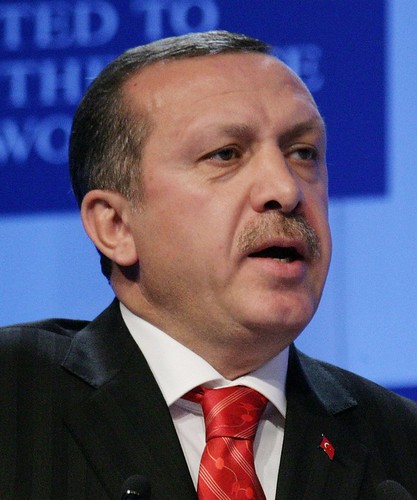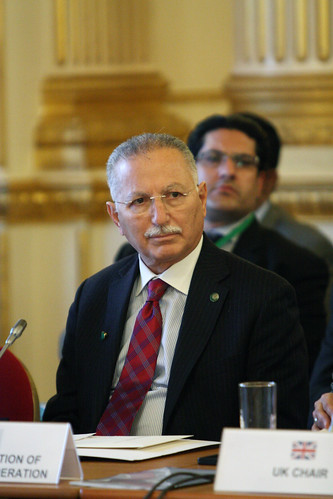The growing crisis in Iraq and Syria, with the terrorist organization ISIL (or ISIS) and the fear it has been inspiring has been the focus of much of the world’s attention. With the failure of the US-trained and –equipped Iraqi army in combating this threat to regional stability, the surprise has been the Kurdistan Regional Government (KRG) in northern Iraq and its fighters, the peshmerga. Almost overnight, the KRG has managed to expand their territory to include the long-sought-after city of Kirkuk, and more importantly has emerged to play a pivotal role in determining the future of both Iraq AND Syria.
If the Kurds of Iraq are being portrayed as the kingmakers of that country, so too are the Kurds of Turkey. Almost slipping under the radar, Turkey, one of the region’s most powerful economies and military powerhouse, is about to enter into its first ever election to choose a president by popular vote, scheduled to be held on August 10, 2014 (with a potential runoff vote on August 24th). Oddly enough, although everyone expects him to run for the position, Turkey’s notoriously short-tempered Prime Minister Recep Tayyip Erdoğan has not yet officially entered the race. Turkey’s current President Abdullah Gül doesn’t look set to run for a second term, effectively opening the door for Erdoğan, at least from within the ruling AKP. But Erdoğan’s pugnacious style has been hurting him at the polls and internationally, little by little, with foreign policy gaffes, polarizing domestic politicking, and allegations of corruption and subsequent alleged cover-ups. Having already alienated many of the more liberal voters who had originally voted for his party over the past 12 years, most clearly demonstrated by the widespread Gezi protests during the summer of 2013, and with his support seeming to have been distilled to its core in the March 30, 2014 local elections, Erdoğan has been courting the country’s Kurdish voters in an effort to make up the difference in his votes to secure the 50%+1 that he’d need to win a first-round knockout victory.
So the Kurds of Turkey, as heterogeneous as they are as a community, seem set to be the kingmakers in Turkey. So says much of the media that’s covering the election, in any case. The key element that most pundits seem to miss is that Erdoğan’s success over the past 12 years has been as much due to his ability to divide his opponents’ votes or at least play off existing divisions, as his own ability to use the tense divisions in Turkish society to win the votes of the historically disaffected and marginalized in the country.
But it’s possible that Erdoğan’s luck is running out with the unprecedented and increasingly vocal opposition to his rule. While waiting for Erdoğan’s official announcement that he’s to be the AKP’s candidate, the opposition CHP and MHP, which have long been rivals, have made history by putting forward a joint candidate: Dr. Ekmeleddin İhsanoğlu. A Cairo-born Turkish citizen, scholar, and former head of the Organisation of Islamic Cooperation (OIC), İhsanoğlu represents an unprecedented attempt by the CHP and MHP to put aside their differences (itself a first) to defeat Erdoğan. Perhaps more importantly, however, he also represents a move by the CHP to shed its old image of a hardline secularist and leftist party by embracing a pious, albeit secular, conservative as its candidate.
And therein lies the crux of the matter. Turkey’s Kurdish parties, the BDP and the newly-formed HDP, will be critical in determining the ultimate winner of the presidential race, as they should be if Turkey’s government is to be truly representative of the population, significant minorities in particular. That said, however, the groups that will determine whether or not İhsanoğlu will be a viable challenger to Erdoğan are not political parties in their own right. Whether the CHP/MHP opposition alliance succeeds against the AKP is entirely in the hands of the CHP, or more specifically its factions. Essentially, the CHP’s factions are the real kingmakers in this election, and are the wildcards that can win or lose the election for İhsanoğlu before the Kurdish vote becomes relevant.
Dissenting voices were heard from within the CHP almost immediately after the announcement that İhsanoğlu was to be the CHP/MHP joint candidate (or çatı adayı, in Turkish parlance), mainly from corners that were critical of his ‘not accurately representing party values’. The very fact that İhsanoğlu was not chosen to be the CHP’s candidate, but rather a joint candidate that would try to represent all of Turkish society, or at least as much of it as possible, seemed to be lost on these dissenters, who could best be described as hardliners. Indeed, as of June 30, 2014, some of these hardline elements within the CHP have decided to nominate their own candidate from within the party itself, namely Emine Ülker Tarhan (CHP, Ankara). Though she would make an excellent candidate under different circumstances, she would clearly be seen as a CHP candidate, thus alienating non-CHP voters by default, especially conservatives. In essence, she is an ideal candidate for a time when conservative voters didn’t have a viable religious-conservative alternative, embodied by Erdoğan. Interestingly, according to Şevki Kulkuloğlu’s (CHP, Kayseri) official Twitter account however, Tarhan herself has rejected becoming a candidate.
So what chance would a candidate like Tarhan or even former CHP head Deniz Baykal theoretically have? Minimal, to say the least. Or rather, they would not be able to defeat Erdoğan. What she and other similar candidates (should they appear) can do is dilute opposition votes among multiple candidates, or reduce İhsanoğlu’s votes because of the casting of blank ballots, and voting for candidates for ideological reasons instead of strategic ones. Or worse, the campaigning of alternate candidates can result in voters abstaining in protest, lowering voter turnout, and magnifying the weight of ballots cast in favour of Erdoğan, whose base typically turns out in large numbers. Effectively, opposition candidates who appeal to only narrow portions of the Turkish electorate will only strengthen Erdoğan’s chances of being elected president.
What we see here is the AKP’s greatest electoral weapon against the CHP on display: the CHP’s nature itself. And this is a symptom of a CHP that has remained unable to adapt to changing circumstances over the years, and thus ineffective. That said, the CHP is also probably one of the parties better suited to run the country in one sense: the lack of strong internal party discipline showcased in this instance means that the CHP is actually a more fundamentally democratic party, at least on the surface. The problem is that while this characteristic is excellent for internal debating of policy if the CHP is in power, as it would ideally produce better decisions, it is a significant weakness that will prevent the CHP from ever being elected over other parties with stronger party discipline, such as the MHP of Devlet Bahçeli or more obviously the AKP under Erdoğan’s iron grip. In a typically Turkish contradiction for politics, the CHP is set up well to rule Turkey, but still cannot figure out how to maintain its unity long enough to win an election to do just that.
There is an old Turkish expression: until you cross the bridge, you must call the bear ‘Uncle’. Here’s my advice to the CHP’s politicians and voters: until you win the election, call Ekmel Bey ‘aday’ (candidate).





August 11th, 2014 at 19:43
[…] he is “not a child of this land [Turkey”. The real question (and one that was tackled in my previous article) is what the traditionally fickle CHP voters will do, specifically whether they will cut short […]